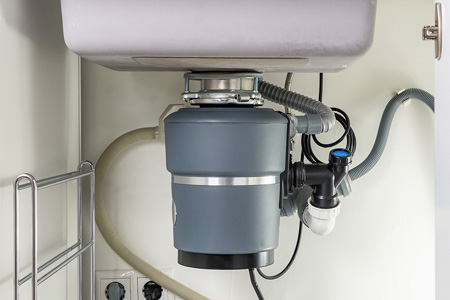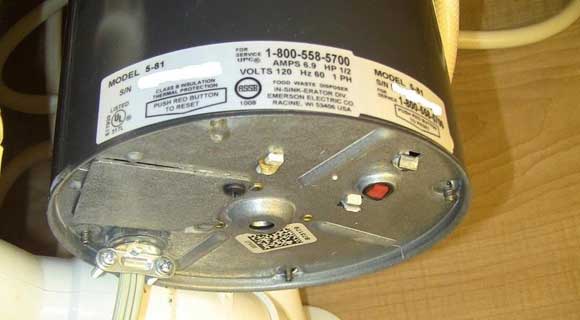Top Tips for Fixing a Leaking Waste Disposal Unit
Top Tips for Fixing a Leaking Waste Disposal Unit
Blog Article
We've stumbled upon this post about Garbage Disposal Leaking From Bottom below on the net and reckoned it made perfect sense to write about it with you over here.

Garbage disposals are necessary kitchen home appliances that help in dealing with food waste efficiently. Nonetheless, a leaking waste disposal unit can be an aggravating and messy trouble to deal with. The good news is, many leaks can be fixed conveniently with a few simple steps. In this short article, we will go over how to repair a leaking waste disposal unit successfully.
Introduction
Garbage disposals are installed under cooking area sinks and are designed to shred food waste right into smaller items, enabling it to pass through the pipes system easily. While these gadgets are usually trusted, leakages can take place gradually as a result of deterioration, loosened connections, or damages to the device.
Step-by-Step Overview to Dealing With a Leaking Garbage Disposal
Shut off the Power
Prior to trying any type of repairs, make sure that the power to the garbage disposal system is shut off to prevent the risk of electric shock.
Locate the Leak
Identify the specific location of the leak and identify the reason
Tighten up Connections
Utilize a wrench to tighten up any loose connections in between the disposal system and the plumbing system.
Change Seals or Gaskets
If the leakage results from worn seals or gaskets, remove the old components and change them with new ones.
Patching Cracks or Holes
For fractures or holes in the disposal unit, use epoxy or an appropriate patching product to seal the damaged location.
Determining the Source of the Leakage
Before trying to repair a dripping garbage disposal, it is vital to recognize the resource of the leak. This can usually be done with aesthetic evaluation or by carrying out basic tests.
Visual Inspection
Examine the garbage disposal device carefully for any type of signs of water leak. Pay close attention to areas around seals, gaskets, and link factors.
Testing for Leaks
One means to check for leaks is by running water through the disposal system and checking for any type of noticeable signs of leakage.
Typical Reasons For Leakages in Rubbish Disposals
Worn Seals and Gaskets
Seals and gaskets play an important function in stopping water from leaking out of the waste disposal unit. In time, these components can wear away, resulting in leakages around the disposal unit.
Loose Links
The connections in between the garbage disposal and the pipes system can end up being loose in time, causing water to leak out during operation.
Cracks or Holes in the Disposal Unit
Physical damages to the garbage disposal, such as splits or holes in the real estate, can likewise lead to leaks.
Devices and Materials Needed for Repairing a Leaking Garbage Disposal
Prior to starting the fixing process, collect the needed tools and materials, including a screwdriver, flexible wrench, plumber's putty, replacement seals or gaskets, and epoxy or patching material for fixing fractures or holes.
Checking the Waste Disposal Unit After Fixing
Once the repair service is full, check the garbage disposal by running water via it to guarantee that the leak has actually been resolved.
Preventive Upkeep Tips to Stay Clear Of Future Leaks
To stop future leaks, it is vital to execute regular maintenance on your garbage disposal. This includes keeping it clean, avoiding putting non-food products or tough objects down the disposal, and regularly looking for leakages or various other issues.
Final thought
In conclusion, fixing a leaking waste disposal unit is a fairly straightforward process that can be finished with basic devices and products. By following the steps described in this write-up and practicing preventive maintenance, you can keep your waste disposal unit in good working condition and stay clear of pricey repair services in the future.
HERE’S HOW TO FIX YOUR GARBAGE DISPOSAL
WHAT TO DO IF SOMETHING IS STUCK IN YOUR GARBAGE DISPOSAL
If the impeller won’t turn, there’s probably something stuck in the disposal. It could be a steak bone or peach pit, although plumbers report pulling all sorts of inappropriate objects out of disposals, such as bottle caps or aluminum foil. Make sure power to the disposal is off, and look inside to see if you can see the source of the jam.
Never stick your fingers in a disposal. Pull out anything you see with tongs or pliers.
If the disposal still won’t work, it may be time to call a plumber or consider buying a new disposal. GEM Plumbing & Heating is here for all of your garbage disposal needs.
WHAT TO DO IF YOUR GARBAGE DISPOSAL DRAIN IS CLOGGED
Take everything out from underneath your sink and put a bucket or other container under your disposal to catch any water that drains out. Disconnect your disposal from the power supply. If it’s plugged into a wall outlet, unplug it. If it’s hardwired into an electrical box, go to the electrical panel and turn off the breaker for the disposal. Pour ¼ cup of baking soda into the drain, followed by ½ cup of white vinegar. Give the solution a few minutes to fizz and do its work. Look into the disposal with a flashlight to see if you can see an object that might be causing the clog. If you see it, remove it using tongs or pliers. MORE TIPS ON DEALING WITH A CLOGGED GARBAGE DISPOSAL
Never use drain cleaner in a garbage disposal. It can damage the plastic parts inside the disposal. You can also be splashed with the caustic liquid while working to clear the clog. Beware! Never stick your fingers into a garbage disposal. Trust us — not a good idea. In many instances, your dishwasher drains through your garbage disposal. This allows the disposal to grind any large food particles that may be drained out of your dishwasher. There are some jurisdictions, however, where the plumbing code prohibits such a connection. WHAT TO DO WHEN YOUR DISHWASHER DRAINS THROUGH THE DISPOSAL
Run some water in the sink so your plunger has at least a ½-inch of water to create a seal and plunge vigorously up and down several times. You may need to repeat this several times. Run hot water down the drain to clear any residue that remains.

Do you like reading about Why Is ? Create feedback below. We'd be delighted to listen to your feelings about this blog posting. Hoping that you come back again before long. Sharing is nice. Who knows, you may very well be helping someone out. Thanks so much for your time spent reading it.
Article Report this page